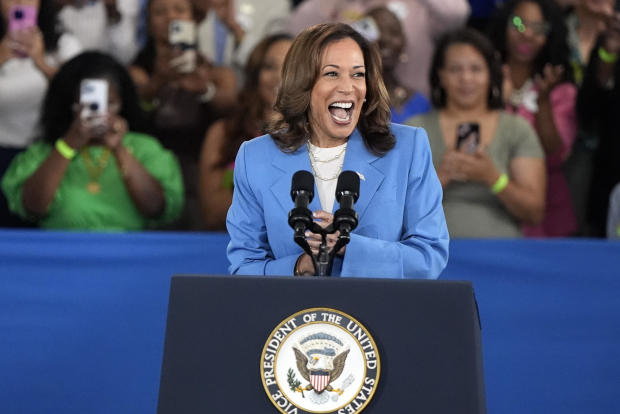
Vice President Kamala Harris speaks at a campaign event at Hendrick Center for Automotive Excellence on the Scott Northern Wake Campus of Wake Tech Community College in Raleigh, N.C., Friday, Aug. 16, 2024. (AP Photo/Mike Stewart)
Vice President Kamala Harris unveiled her economic plans Friday in Raleigh, North Carolina, marking the first time she has released a major policy initiative since President Biden dropped out of the race last month.
North Carolina is a key battleground state in November, and Harris is trying to persuade voters there and across the country that her policies can bring costs down and give Americans economic opportunity. Harris noted it was her 16th visit to the state since becoming vice president — and President Biden’s first stop after the fateful debate performance that ultimately led to his departure from the race.
Harris said she would offer more details about her economic plan in the weeks ahead but on Friday, she focused efforts to lower the cost of living.
“When I am elected president, I will make it a top priority to bring down costs and increase economic security for all Americans,” Harris said at Wake Tech Community College in Raleigh. “As president, I will take on the high costs that matter most to most Americans, like the cost of food. We all know that prices went up during the pandemic when the supply chains shut down and failed. But our supply chains have now improved. And prices are still too high.”
Harris also blasted former President Donald Trump over his economic policies. She said Trump would impose “what is in effect a national sales tax,” referring to recent remarks Trump made about expanding tariffs on goods imported into the U.S. by 10-20%.
New housing
Harris is calling for the construction of 3 million new housing units in her first four years in office. The Biden administration has previously called for the construction of 2 million new homes.
She wants to incentivize these new units with a tax break for builders who construct properties for first-time home buyers. She is also proposing a $40 billion fund to help local governments find solutions to the lack of housing supply.
“There’s a serious housing shortage. In many places, it’s too difficult to build, and it’s driving prices up,” Harris said. “As president, I will work in partnership with industry to build the housing we need, both to rent and to buy. We will take down barriers and cut red tape, including at the state and local levels. And by the end of my first term, we will end America’s housing shortage by building 3 million new homes and rentals that are affordable for the middle class.”
Campaign officials said Harris will call on Congress to pass the Preventing the Algorithmic Facilitation of Rental Housing Cartels Act, which would prevent landlords from using price-fixing algorithms to increase rents. She also wants lawmakers to pass the Stop Predatory Investing Act, a bill that would limit tax breaks for large investors and private equity firms that acquire single-family rental homes in bulk.
“Some corporate landlords, some of them, buy dozens if not hundreds of houses and apartments,” Harris said. “Then they turn them around and rent them out at extremely high prices. And it can make it impossible then for regular people to buy or even rent a home.”
Harris will also propose providing Americans who have paid their rent on time for two years with up to $25,000 in down-payment assistance, with more support for first-generation homeowners.
Expansion of Child Tax Credit
Harris is also proposing an expansion of the Child Tax Credit to provide a $6,000 tax cut to families with newborns. GOP vice presidential nominee and Ohio Sen. JD Vance has proposed a similar but more general $5,000 Child Tax Credit expansion. The Committee for a Responsible Federal Budget pointed out that this Vance’s proposal, which is 150% above the current $2,000 tax credit, could mean creating trillions in debt. “We could easily be talking about $2-$3 trillion in additional borrowing over the next decade,” Marc Goldwein, senior policy director for the Committee for a Responsible Federal Budget, told CBS MoneyWatch regarding the Vance proposal.
Vance has suggested his tax credit would not be subject to income thresholds, while Harris’ proposal would apply to lower- and middle-income families.
Trump campaign senior adviser Brian Hughes said there’s been “a lot of talk from the Harris campaign criticizing Senator Vance and campaign for advocating for policies that are pro-family and meant to support those who are raising children. So it is a bit ironic to see the Vice President Harris suddenly embrace policies that she seemed to stop at just a few weeks ago.”
Harris also wants to restore the Child Tax Credit to the pandemic-era American Rescue Plan levels, which would give working- and middle-class families with children up to $3,600 per child.
She is also proposing a Earned Income Tax Credit of $1,500 for those in lower-income jobs who aren’t raising a child. The campaign also emphasized that Harris will ensure “no one earning less than $400,000 a year will pay more in new taxes.”
Both Vance’s and Harris’ proposals would require congressional approval.
Addressing inflation
In North Carolina, Harris also talked about how much higher prices are for specific goods like bread than they were pre-pandemic, something Mr. Biden has typically been less likely to do.
In the first 100 days of her administration, Harris, according to a campaign fact sheet, would work to bring down the cost of groceries by working with Congress on a federal ban on price gouging on groceries and other goods and new authorities for the Federal Trade Commission and state attorneys general to enable them to impose penalties on rule-breaking companies.
“Look, the bills add up,” Harris said Friday. “Food, rent, gas, back to school clothes, prescription medication — after all that, for many families, there’s not much left at the end of the month.”
Extreme consolidation in the food industry has led to higher prices that account for a large part of higher grocery bills. Harris plans to crack down on unfair mergers and acquisitions that give big food corporations the power to jack up food and grocery prices and undermine the competition that keeps prices low for consumers. And her plan aims to support smaller businesses, like grocery stores, meat processors, farmers and ranchers, so those industries can be more competitive.
According to the most recent CBS News poll, only 9% of registered voters rated the condition of the national economy as “very good,” with the economy and inflation ranking as the top issue of concern consistently across 2024 polls. Inflation has cooled since its peak in June 2022, but many voters are still feeling financial strain. Prices are still 20% higher overall than prior to the COVID-19 pandemic.
In a statement, the Trump campaign accused Harris of trying to implement price controls, which it said “have been tried — and failed — throughout history as they inevitably lead to food lines, shortages, and skyrocketing inequality.” The Trump campaign also blamed Harris’ and Mr. Biden’s economic policies for creating the problem, “aided and abetted by Harris’s tiebreaking votes on trillions in inflationary spending.” However, economists have said that pandemic-related federal spending by both Trump and Mr. Biden fueled high inflation.
Throughout battleground states, voters often tell CBS News that the economy remains a top issue when heading to the voting booths.
“Workforce development, creating job opportunities, making sure everyone can advance in different career fields,” said Abraham Camejo in Las Vegas ahead of Harris’ rally on Saturday when asked about economic priorities. “The policies that benefit big corporations and the middle class are different.”
According to a recent CBS News poll, on a question about policies that will improve people’s finances, Harris trailed Trump with 45% of registered voters saying they’d be financially better off with the former president, compared to 25% for Harris.
Eliminating taxes on tips
Harris’ economic policy remarks followed her pledge last Saturday at a rally in Las Vegas to eliminate taxes on tips and raise the minimum wage.
“When I am president, we will continue our fight for working families including to raise the minimum wage and eliminate taxes on tips for service and hospitality workers,” Harris said recently at a rally that included Nevada Culinary union members.
A Harris-Walz campaign official noted that her pledge would require legislation.
This marked the first time Harris made a proposal on eliminating taxes on tips for service workers, a similar idea to one first pitched by Trump in June, also at a rally in Las Vegas.
In 2025, lawmakers are set to have a major opening on tax legislation given the expiration of some tax changes made during Trump’s presidency in 2017. Control of Congress is likely to be a major factor on this issue, since Republicans held the House, Senate and White House when Trump’s 2017 tax cuts became law.


